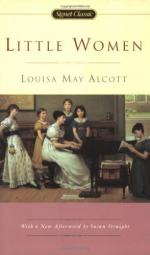|
This section contains 3,817 words (approx. 13 pages at 300 words per page) |

|
SOURCE: "'The House-Band': The Education of Men in Little Women," College English, Vol. 47, No. 6, October, 1985, pp. 571-78.
In the following essay, Dalke argues that Little Women, particularly the second part, redefines family according to matriarchal values.
Seven years ago, Nina Auerbach elevated Little Women from children's classic to a place on the college syllabus. She did so by re-visioning the book, by instructing us, as we in turn gleefully instructed our students, in the "plenitude" and "primacy" of the sisterhood set forth in the novel's first half. The "world of the March girls," Auerbach told us, is "rich enough to complete itself (Communities 58, 61, 55).
In Auerbach's vision of the fiction, the happy marriages at the end of Little Women are irrelevant. Auerbach not only exalted the novel's first half at the expense of the second, but offered an alternative ending. She described Alcott's article on "Happy Women," published in...
|
This section contains 3,817 words (approx. 13 pages at 300 words per page) |

|


